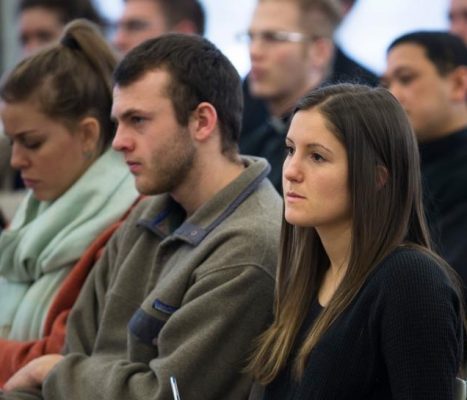WASHINGTON (CNS) — Although higher educated U.S. adults are typically linked with lower levels of religious practice, a new study by the Pew Research Center shows that Christians are the exception to the rule.
Among Christians, those with higher levels of education appear to be just as religious as those with less schooling and highly educated Christians are even more likely than less-educated Christians to say they are weekly churchgoers.
Christians are also almost equally likely at all education levels to pray daily, attend worship services weekly and say they believe in God with absolute certainty.

The study, released April 26, shows that 52 percent of highly educated Christians are most likely to say they are weekly churchgoers, compared with 45 percent of those with some college and 46 percent with at least some high school.
The tendency for Christian college graduates to practice their religion on par with their less highly educated counterparts is evident across a variety of Christian traditions, but among evangelical Protestants, the numbers are highest. Eighty-seven percent of evangelical protestants with college graduates say they are highly religious. Those with some college education fall in at 83 percent; 82 percent of highly religious evangelicals have a high school diploma or less schooling.
In looking specifically at Catholics, they appear less religiously observant than evangelicals. But like Christians in general, they follow similar religious practices no matter what their education level is. Sixty-two percent of college-educated Catholics identify as highly religious compared to 61 percent among Catholics with some college education and 60 percent of Catholics with a high school education.
Looking at the U.S. public overall, the study reveals that more education tends to go along with less religious practice. Among all U.S. adults, college graduates are considerably less likely than those who have less education to say religion is “very important” in their lives: Forty-six percent of college graduates say this, compared with 58 percent of those with no more than a high school education.
Highly educated Americans also are less inclined than others to say they believe in God with absolute certainty and pray daily. When asked about their religious identity, 11 percent of college graduates describe themselves as atheists or agnostics compared to 4 percent of U.S. adults with a high school education or less.
The study does not offer any explanations for these findings other than providing the data, most of which was obtained and further analyzed from Pew’s 2014 U.S. Religious Landscape Survey of more than 35,000 Americans reached on randomly dialed cellphones and landlines. The margin of error for results based on the full sample in that survey is plus or minus 0.6 percentage points.






















